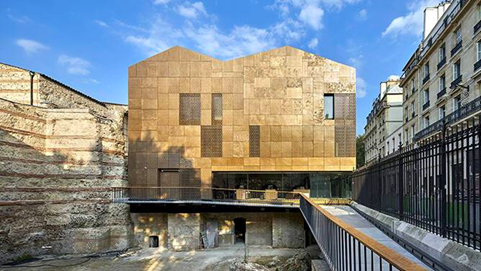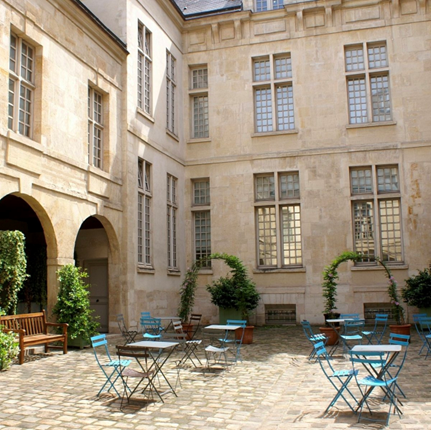1. Hôtel national des Invalides

Located in the heart of Paris, Hotel national des Invalides is more than just a pretty face with its baroque Dôme
des Invalides that makes a notable addition to the Parisian skyline. This museum of military history was originally
commissioned by the Sun King himself (Louis XIV) to accommodate wounded soldiers and veterans who could not be
reintegrated into regular society because of the severity of their wounds and various amputations, hence the name
“Hôtel des Invalides.” Currently, the Hôtel functions as the Musée de l'Armée replete with French military artifacts
from maps of battlefields to weapons, uniforms, instruments, and much more.
Within the esplanade des Invalides located in front of the imposing and intricate façade of the entrance to the
building complex, you might see little holes in the grass which can be attributed to the uncontrolled rabbit
populations that have inhabited the gardens of Les Invalides since World War II when French resistance fighters hid
American soldiers in the monumental complex and bred rabbits to feed them. For the fattest feral rabbits you have
ever seen, the military history of France, and the unnecessarily enormous tomb of Napoleon, pay a visit to this
fascinating museum!
129 Rue de Grenelle
75007, Paris
2. Musée des Archives Nationals

Nestled behind the elegant walls of Hôtel de Soubise, Musée des Archives Nationales is set off the main road by an
amphitheatrical forum with a clear cut garden. The imperious Rococo building is grand and officious though is offset
by the rambunctious foliage of the English style garden attached to the Hôtel’s eastern wing. Inside, on display you
will find media artifacts and historical documents which chronicle and exemplify the complicated history of France.
The museum is also absolutely free to visit! If you’re exploring le Marais for a day, grab a coffee at Terres de
Café then stroll the curved garden before heading into the museum.
60 Rue des Francs-Bourgeois
75003, Paris
3. Musée Cluny

A monument of medieval architecture unto itself, Musée Cluny, houses an impressive collection of medieval artifacts
and sits atop ancient Roman baths that once occupied the area. The museum has been used in previous epochs for
multiple, diverse purposes such as an astronomer’s observatory, a religious college of La Sorbonne, and even a
dissection room! At present, the museum is a gateway to the medieval epoch and the Roman occupation of Paris, and
contains over 23,000 artifacts from the Gallo-Roman period up until the blossoming of the French Renaissance in the
16th century. History geeks - this one's for you! (From yours truly, a certified (MA) history nerd)
28 Rue du Sommerard
75005, Paris
4. Musée National d’Histoire Naturelle

Located within the sprawling Jardin des plantes, the Musée National d’Histoire Naturelle (say that five times fast!)
is a stately fixture complimenting the surrounding French-style garden. Originally established in 1635 as a garden
for medicinal plants but formally founded in 1793 during the French Revolution, the museum has always been dedicated
to furthering biological research and serving as an archive for natural history. Nicknamed “The Louvre of the
Natural Sciences,” the museum hosts several galleries designated for specific subjects: The Grand Gallery of
Evolution, The Gallery of Mineralogy and Geology, The Gallery of Botany, and The Gallery of Paleontology and
Comparative Anatomy, both subjects of which were invented in France! Bring the kids or nerd out by yourself or with
your friends or significant other, this museum certainly has something for everyone!
57 Rue Cuvier
75005,Paris
5. Musée Cognacq-Jay

Located in Hôtel Donon in the center of Le Marais, Musée Cognacq-Jay offers a uniquely curated selection of 18th
century paraphernalia as collected by the Cognacq couple, who founded the Samaritaine department store, throughout
the early 20th century. What distinguishes this museum from others containing items 18th century art and culture, is
its teleological impetus, that is to say, its intention in acquiring these objects is vectored by an early 20th
century fascination with the 18th century as opposed to a collection formulated during the early 19th or late 18th
century itself.
The museum scintillates luxurious 18th century appeal with a coquettish painting, “Diana After the Hunt,” (1745) by
the Rococo master of sensuality, François Boucher reflecting the libertinage of the epoch, and the ornate yet richly
contrasting, “Balaam and the Ass,” (1626) by the master of shadows and realism, Rembrandt inspiring meditations on
morality during this period of the later Enlightenment.
For lovers of textiles, this museum also houses a tremendous collection of 18th century furniture and miscellaneous
objects as were venerated in the first quarter of the 20th century.
8 Rue Elzévir
75003, Paris
6. Musée Carnavalet

Composed of two adjacent mansions, Hôtel Carnavalet and Hôtel le Peletier Saint Fargeau, Musée Carnavalet is devoted
to telling the story of Paris from the neolithic settlements established in the area, through the Roman rule of Gaul
and founding of the outpost ‘Lutetia,’ by the Parisii people, to the establishment of a post-Roman city in Île de la
Cité, the rise of Paris as a French capital during the Medieval period, and its flourishing during the Renaissance,
to the Enlightenment, the Revolution and right up until the Belle Époque and the early 20th century. If you have a
few hours to spare, Musée Carnavalet is the perfect museum for a comprehensive understanding of the history of
Paris!
23 Rue Sévingé
75003, Paris